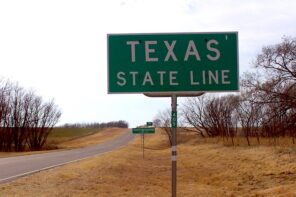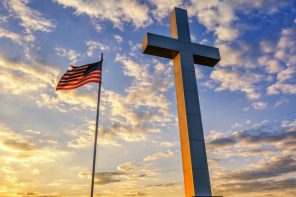It seems to have been meant to be—and not in that predestination way. After endless months of testimony and debate, the Texas State Board of Education (SBOE), led by Don McLeroy, passed standard after controversial standard in its attempt to refashion education in the Lone Star State for the next ten years.
Fate or God’s will aside, there is plenty of cause to complain about who and what got included and why, but there’s something deeper here in the heart of Texas than just a debate about events and dates. It’s about who we are as Westerners—and I mean Western civilization—and how we think of ourselves as individuals and citizens. Because in Texas, that’s about to change big time. And if we all buy their textbooks, it’s going to change for us, too.
If anything, this little escapade that started about national textbook sales and has now turned into an epic ideological battle about how the West understands itself has been healthy for all of us. I find it to be a nice cleansing of the palate about what it means to be citizens and how we understand and teach our own identity. We get lazy and, since we live in a technology-driven service economy, we forget the importance of how the humanities and the arts express and define us and our society.
Monarchist or Marxist, We Educate in Our Image
The humanities don’t make us materially wealthy. They don’t increase our market share or increase the size of our homes. They don’t lower our taxes or pay our medical bills. And so they get pushed aside in our everyday affairs. The humanities of history and literature and philosophy and religion speak to the human condition—something invaluable.
And people take them for granted, until someone else begins to define and delineate for them what it means to be human and free. Only then do people get up in arms. If we are going to conserve our humanities, we must be actively involved in our politics and education. Only through the reflection on what it means to be human—a reflection that engages with those beyond our immediate community, state, and nation—can we teach and learn to become better humans for both ourselves and each other.
As Americans, we like to think that what our children learn in school is outside of politics, and that our kids can learn facts and figures and how to play well with one another so they can grow up and get jobs and follow their dreams. But public education, by nature of the word “public,” is political. States use public schools to educate their future citizens for their own purposes. Through those public schools, state governments develop their citizens and train their future workforce to ensure economic competitiveness and social cohesion.
Public schools instill within children identities of many kinds; including those at the local, state, federal, and international levels. It’s what makes us a community, a nation, a people. Now this may bump up against our lofty ideas about education, but I do not mean the ideal of education, concerned with the liberal arts and the natural sciences; I mean the role of education for the ensured success of a political body, whatever that body may be.
Furthermore, we must always remember that governments are conservative by nature. It’s no surprise that people and parties in power want to solidify, maintain, and expand that power. Every institution will act in conservative ways to ensure the success and future of its own ideas. Followers of both monarchism and Marxism, for example, are deeply conservative in their beliefs and methods to remain monarchists and Marxists. So the government of the State of Texas, like every other state, has the obligation to itself to create citizens—from an early age—in its own image. This image, then, requires the inculcation of a particular identity, which is accomplished primarily through social studies courses like history and government.
And this is what the Texas SBOE has recently accomplished: the establishment of standards, through a simple majority vote, of a certain kind of identity. Now, this new Texas identity is, by definition, distinct from every other state’s. But more importantly, this particular incarnation of the Texas SBOE has sought to establish for its youth and itself a particular and narrow kind of Christian narrative. It’s a revisionist narrative about the founding and purpose of the United States as a whole, whether the majority of the citizens of Texas (or the United States) believe this narrative or not.
On the day of the final vote, board member Cynthia Dunbar, opening the meeting in prayer, said as much when she prayed: “I like to believe we are living today in the spirit of the Christian religion. I like also to believe that as long as we do so, no great harm can come to our country.” Dunbar was quite clear: only our citizens’ shared belief in Jesus and Divine Providence can save and preserve Texas and the nation—and the SBOE’s new social studies curriculum will teach the youth of Texas just that.
Why Keep Calvin?
More important than the battle to include Thomas Jefferson as an Enlightenment thinker in the standard was the inclusion of the Age of Enlightenment in the standard at all. The Enlightenment focuses on the intellectual reasoning of individuals for their self-determination, not the divine revelation of God through the Christian Scriptures. To counter teaching the Enlightenment, the SBOE’s conservative Christian bloc had removed both Jefferson and the Enlightenment, replacing them instead with Saint Thomas Aquinas, John Calvin, and the English jurist Sir William Blackstone. In the course of the final debate, Dunbar loudly opposed the removal of Calvin and she got her way. But why? And what role does Calvin, the French-born theologian of the Protestant Reformation, have to do with our understanding of American government?
Throughout The Institutes of the Christian Religion, Calvin, a lawyer by training, comprehensively establishes and describes God’s authority and action as complete in every moment of human existence. He opens his volume with these words: Our wisdom, in so far as it ought to be deemed true and solid wisdom, consists almost entirely of two parts: the knowledge of God and ourselves.
If there ever was an anti-Enlightenment axiom, this is it. And Dunbar knows this. Calvin’s Divine Providence, through the exclusive salvific death and resurrection of Jesus Christ, is absolute. Everything is predestined for God’s own glory and has been manifested in the Gospel for humanity’s salvation and damnation. In light of this, in his very last chapter, Calvin offers his concept of government. Basically, it is The Institutes put into civil practice.
With his high view of inerrant, God-breathed Scripture, Calvin employs story after biblical story to establish God’s choice in the determination of every ruler from David to Nebuchadnezzar and beyond. By Divine Providence and holy decree, God (not the people) chooses the rulers, though the people may think they have some sort of democratic power. And those who believe that laws do not come from God Calvin calls “seditious.”
He writes, “the first duty of subjects towards their rulers, is to entertain the most honorable views of their office, recognizing it as a delegated jurisdiction from God, and on that account receiving and reverencing them as the ministers and ambassadors of God.”
Later, he writes “let no man here deceive himself, since we cannot resist the magistrate without resisting God.” In The Institutes, Calvin begins with our knowledge of God the Creator and ends with the complete manifestation of God’s will in our governments and social lives.
What’s worse is that if teachers present this view of history and government, students will encounter the Age of Enlightenment in light of Calvin’s all-encompassing theocratic system. Even the deist Voltaire will write in light of Calvin’s statecraft. So comprehensive and extensive is Calvin’s concept of predestined government, it effectively invalidates the concept of the Separation of Church and State before it is even introduced!
Dunbar, McLeroy, and the rest of the Board members have offered a major blow against our culture’s own post-Enlightenment understanding of self-determination and free will. Texas does not go back two hundred years to the Framers of the Constitution. It goes back 400 years to the Reformation itself, before democracy was even a modern concept. For a full decade, Texas students will not learn the distinct intellectual role the Enlightenment played in contrast to the Reformation. So much for the concepts of free will and self determination in life and government in the State of Texas for many years to come.
So, what does this mean for the population and people of Texas? Well, ten years of this new Christian identity will be taught to their children until the standards are again debated, voted upon, and rewritten. Meaning that, for a distinct population of Texas, if they are educated through the entire primary and secondary public school system, as far as the majority of this SBOE is concerned they will be excellent voting citizens within this distinct period of Texas history and culture—as long as these students remain within the state and are not required to interact with any other citizen of the United States or some other country.
Texas’ sovereignty over and within its own education system ensures this. Up until the age of eighteen, Texas students will be expected (through rigorous state testing) to understand their political and social selves, their communities, their state, their nation, and their world in a distinct and specific way, decided by this board in the face of accredited academic experts and concerned parents.
Upon graduation in June, they will receive their diploma from their high school and their independent school district of the State of Texas as fully educated by the State and for the State. Then, if they have high grades and test scores, the intellectual capability, and the resources to attend higher education, they will matriculate and discover that they are both woefully unprepared and underqualified to enroll in their chosen academic program.
This is because the educational mandates of the State of Texas have taken them on a trajectory antithetical not just broadly to the rest of the world, but even to the flagship public universities of their own state, the University of Texas at Austin and Texas A&M University, which, like every institution of Texas higher education, is not under the jurisdiction of the SBOE. A population educated in a political vacuum unwittingly and ironically undermines the preservation of its own government and citizenry. And to undermine unexpectedly is to engage in an undesired and uncalculated revolution, not conservation. It’s up to us to make this choice not only for our future, but our past as well.



